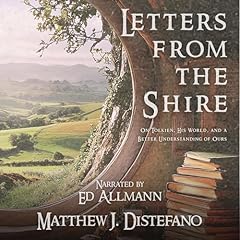
Tolkien, Philosopher of War
No se pudo agregar al carrito
Add to Cart failed.
Error al Agregar a Lista de Deseos.
Error al eliminar de la lista de deseos.
Error al añadir a tu biblioteca
Error al seguir el podcast
Error al dejar de seguir el podcast
 Exclusivo para miembros Prime: ¿Nuevo en Audible? Obtén 2 audiolibros gratis con tu prueba.
Exclusivo para miembros Prime: ¿Nuevo en Audible? Obtén 2 audiolibros gratis con tu prueba.Compra ahora por $20.89
-
Narrado por:
-
John Patrick Walsh
In popular imagination, Tolkien is a Luddite, but recent scholarship has identified Tolkien's extensive modern sympathies. Tolkien, Philosopher of War contributes to this growing literature. His is a modern critique of Enlightenment thinking, specifically those philosophies that wrest the initiative from God in divinizing man. His worry is apocalyptic politics—political movements that take Christ's word out of the realm of grace and make it a platform for political action.
Tolkien took note of a tight analytical connection between the vanity driving commercial civilization and the vanity driving the Promethean fantasies of apocalyptic politics. War is a predictable outcome of this analytical connection. The book's three core theses run: 1) metaphysical: the apocalyptic anxiety of Tolkien's lore is traceable to the gnostic rejection of the analogy of being typical of the philosophies of history that dominated his day; 2) political: in the English context, Tolkien sided with the Tories against Whiggery, defending monarchy as a counterweight to the vanity driving progressive philosophy of history; 3) aesthetic: Futurism's philosophy of history celebrated the Machine; inverting the value order, the Futurism art movement encoded anti-Christianity, fascist politics, and apocalyptic war. Tolkien's "cosmogonical drama" dramatizes an aesthetic resistance to Futurism.
©2024 The Catholic University of America Press (P)2024 Tantor MediaLos oyentes también disfrutaron:



















Las personas que vieron esto también vieron:








